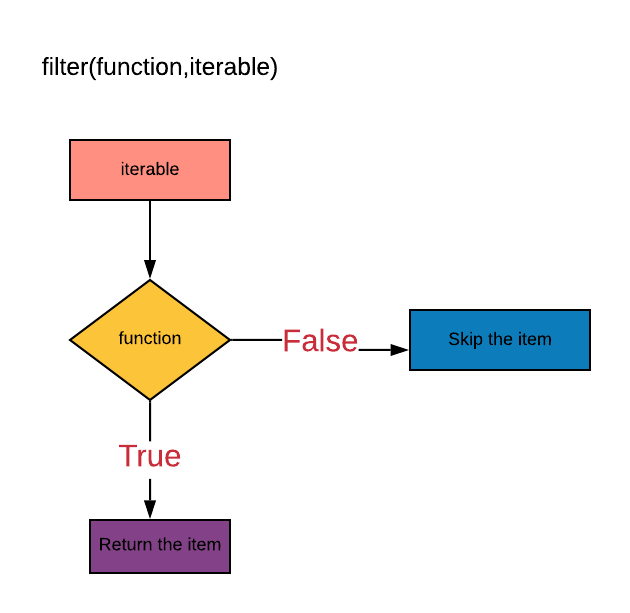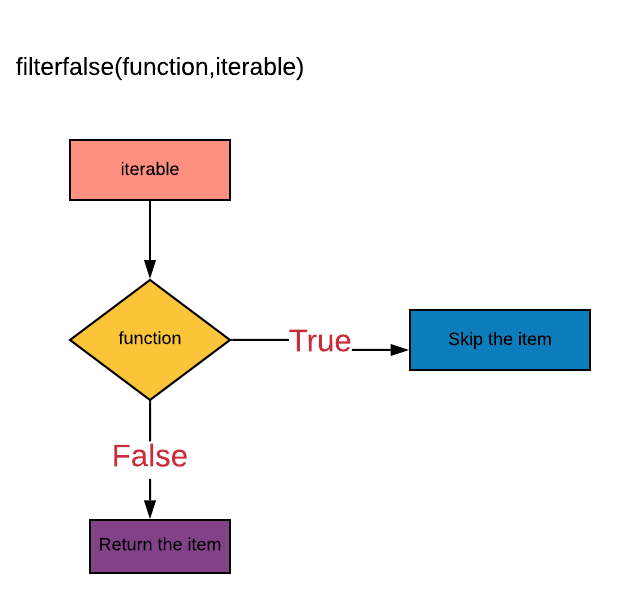Python filter and filterfalse functions guide

python filter function
python filter function
filter(function, iterable)
- iterable — can be sequences like list, tuple, or container or an iterator
- function - function applied to iterable
- return type - is a filter object which is an iterator
Python filter function
Construct an iterator from those elements of iterable for which function returns true. Iterable may be either a sequence, a container which supports iteration, or an iterator. If function is None, the identity function is assumed, that is, all elements of iterable that are false are removed.
Note that filter(function, iterable) is equivalent to the generator expression (item for item in iterable if function(item)) if function is not None and (item for item in iterable if item) if function is None.
We can access the filter object which is an iterator using below mentioned ways:
- We can convert the filter object to sequence objects list using list() constructor and tuple using tuple() constructor
- We can iterate through the filter object using python for loop
- We can access the element in the filter object using the next() function also
Example 1: Using user-defined function in filter()
def even(x):
if x % 2 == 0:
return True
numbers = [1, 2, 3, 4, 5, 6, 7, 8, 9, 10]
filter_object = filter(even, numbers)
print(filter_object)
# output:
# <filter object at 0x7f3c713634a8>
print(type(filter_object))
# output:<class 'filter'>
list(filter_object)
# output:
# [2, 4, 6, 8, 10]
- list numbers is given as an iterable.
- function even() is defined to find the even numbers.
- filter() will return a filter object which is an iterator
- converting the filter object to list using list() constructor
Example 2: Using lambda function in filter()
Filtering values greater than 10 from the dictionary:
my_dict = {'item1': 12, 'item2': 40, 'item3': 2}
filter_object = filter(lambda x: x > 10, my_dict.values())
list(filter_object)
# output:
# [12, 40]
my_list = [5, 9, 10, 15, 25, 50]
filter_object = filter(lambda x: x > 10, my_list)
list(filter_object)
# output:
# [15, 25, 50]
Example 3: Using None in filter()
If function is None, the identity function is assumed, that is, all elements of iterable that are false are removed.
my_list = [2, 5, 8, "", {}, (), [], False, None, "abc"]
filter_object = filter(None, my_list)
list(filter_object)
# output:
# [2, 5, 8, 'abc']
Example 4: Iterating through filter object using for loop
my_list = ["blue", "brown", "red", "green", "back"]
filter_object = filter(lambda x: x.startswith("b"), my_list)
for item in filter_object:
print(item)
# output:
# blue
# brown
# back
Example 5: Iterating through filter object using next() function
- we can access the next element in an iterator using the
next()function
my_list = ["blue", "brown", "red", "green", "back"]
filter_object = filter(lambda x: x.startswith("b"), my_list)
print(next(filter_object))
print(next(filter_object))
print(next(filter_object))
# output:
# blue
# brown
# back
print(next(filter_object))
# output
# Traceback (most recent call last):
# File "<stdin>", line 1, in <module>
# StopIteration
python itertools.filterfalse
python filterfalse function
itertools.filterfalse(predicate, iterable)
Python itertools.filterfalse function
Make an iterator that filters elements from iterable returning only those for which the predicate is False. If predicate is None, return the items that are false.python doc
Example 1: Using lambda function in filterfalse()
import itertools
# iterator will filter the elements from the iterable which returns False for the given function
numbers = [1, 2, 3, 4, 5, 6, 7, 8, 9, 10]
filterfalse_object = itertools.filterfalse(lambda x: x > 4, numbers)
print(filterfalse_object)
# output:
# <itertools.filterfalse object at 0x7f3c713635f8>
list(filterfalse_object)
# output:
# [1, 2, 3, 4]
- import itertools module
- define the lambda function to filter the elements greater than 4
- pass lambda function and iterable list numbers to
itertools.filterfalse()function filterfalse()will return the elements less than 4. It will filter the elements from the iterable which returns False for the given function.- return type is an iterator. converting to list using
list()constructor
Example 2: Using user-defined function in filterfalse()
import itertools
def even(x):
if x % 2 == 0:
return x
numbers = [1, 2, 3, 4, 5, 6, 7, 8, 9, 10]
filterfalse_object = itertools.filterfalse(even, numbers)
list(filterfalse_object)
# output:
# [1, 3, 5, 7, 9]
Example 3: Using None in filterfalse()
import itertools
# if predicate is None, returns the items that are False.
filterfalse_object = itertools.filterfalse(None, [0, 1, 2, 3, [], {}, ()])
list(filterfalse_object)
# output:
# [0, [], {}, ()]


















